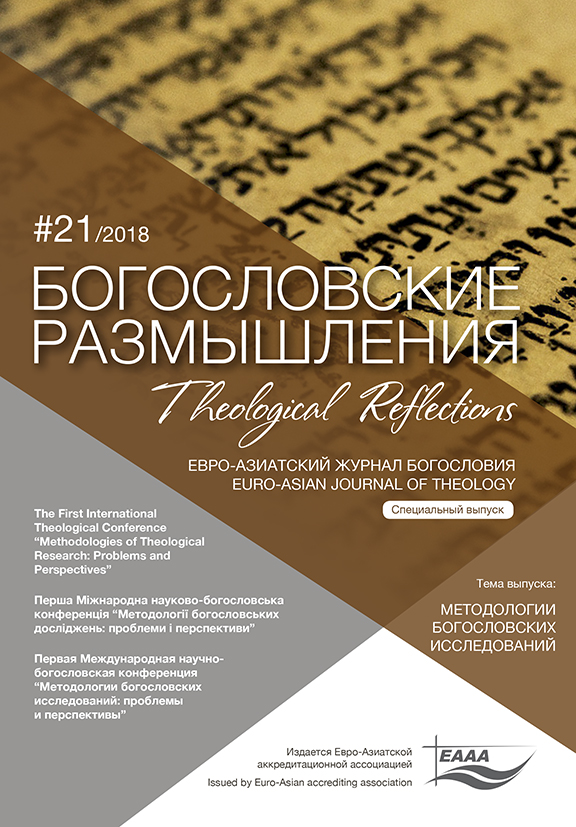Philosophical Hermeneutics as Scientific Approach to the Investigation of Biblical Texts
DOI:
https://doi.org/10.29357/2521-179X.2018.21.10Keywords:
texts as data, rational knowledge, direct meaning, states of affairs in reality, content’s unity, hermeneutical circle, motivation of textual formulations, rational reflexion, tradition, authority, critics of ideology, reasonable service.Abstract
Contents, present in biblical texts, are data, accessible to rational knowledge, and hence — object of philosophical hermeneutics of texts as such. Taking into account the supra-temporal way of existing of texts, a researcher is akin to know, “how it is indeed”, coming out of the direct meaning of text, and basing on the philological fact, that words have their primary meaning, which correctly reflects things and states of affairs in reality. A rational reflection makes to its research’ object the tradition of “exactly such interpretation of texts” and spellings of authorities, goes beyond their frames and checks them on their unimpeachability. Such checking is a “reasonable service” (cf.: Rom 12, 1): usage of the reflexive ability of reason, which belongs to human personhood as image of God.
References
- Hildebrand, Dietrich von, Etyka [Hildebrand, Dietrich von, Ethics]. Lviv: Vyd. UCU, 2002.
- Svi͡ate Pys’mo Staroho ta Novoho Zavitu. Povnyĭ pereklad o. Ivana Khomenka, zdiĭsnenyĭ za oryhinalnymy i͡evreĭs’kymy, aramiĭs’kymy ta hret͡skymy tekstamy [Holy Scripture of the Old and New Testament. A full translation, done by Rev. Ivan Khomenko according to the original Hebraic, Aramaic and Greek texts]. Madrid: Editorial Verbo Divino, 1990.
- Benedikt XVI, Ansprache im Treffen mit den Vertretern aus dem Bereich der Wissenschaften an der Universität Regensburg, 12.09.2006. http://www.vatican.va/holy_father/benedict_xvi/speeches/2006/september/documents/hf_ben-xvi_spe_20060912_university-regensburg_ge.html
- Habermas, Jürgen, Zu Gadamers “Wahrheit und Methode”, in: Theorie-Diskussion Hermeneutik und Ideologiekritik. Mit Beiträgen von Karl-Otto Apel, Claus v. Bormann, Rüdiger Bubner, Hans-Georg Gadamer, Hans-Joachim Giegel, Jürgen Habermas. Frankfurt am Main: Suhrkamp Verlag, 1980.
- Ineichen, Hans, Philosophische Hermeneutik. Freiburg/München: Verlag Karl Alber, 1991.
- Schreiter, Jörg, Hermeneutik — Wahrheit und Verstehen. Berlin: Akademie-Verlag, 1988.
- Список використаної літератури
- Гільдебранд, Дітріх фон, Етика [Hildebrand, Dietrich von, Ethics]. Львів: Вид. УКУ, 2002.
- Святе Письмо Старого та Нового Завіту. Повний переклад о. Івана Хоменка, здійснений за оригінальними єврейськими, арамійськими та грецькими текстами [Holy Scripture of the Old and New Testament. A full translation, done by Rev. Ivan Khomenko according to the original Hebraic, Aramaic and Greek texts]. Madrid: Editorial Verbo Divino, 1990.
- Benedikt XVI, Ansprache im Treffen mit den Vertretern aus dem Bereich der Wissenschaften an der Universität Regensburg, 12.09.2006. http://www.vatican.va/holy_father/benedict_xvi/speeches/2006/september/documents/hf_ben-xvi_spe_20060912_university-regensburg_ge.html
- Habermas, Jürgen, Zu Gadamers “Wahrheit und Methode”, in: Theorie-Diskussion Hermeneutik und Ideologiekritik. Mit Beiträgen von Karl-Otto Apel, Claus v. Bormann, Rüdiger Bubner, Hans-Georg Gadamer, Hans-Joachim Giegel, Jürgen Habermas. Frankfurt am Main: Suhrkamp Verlag, 1980.
- Ineichen, Hans, Philosophische Hermeneutik. Freiburg/München: Verlag Karl Alber, 1991.
- Schreiter, Jörg, Hermeneutik — Wahrheit und Verstehen. Berlin: Akademie-Verlag, 1988.
Downloads
How to Cite
Issue
Section
License
Copyright (c) 2020 Petro HUSAK

This work is licensed under a Creative Commons Attribution-NonCommercial 4.0 International License.
All articles published in the Journal are distributed under a Creative Commons Attribution-NonCommercial 4.0 International License
By submitting an article for publication in Theological Reflections: Eastern European Journal of Theology the author grants the editors the right to publish the article and distribute it in electronic and print form.
The author reserves all copyrights and the right to use the materials of the article in whole or in part for educational purposes, to write his own dissertations, to prepare abstracts, conference reports, oral presentations, etc., as well as post electronic copies of articles (including the final electronic version downloaded from the journal’s official website) on non-commercial web-resources without the consent of the editorial board and founders.



